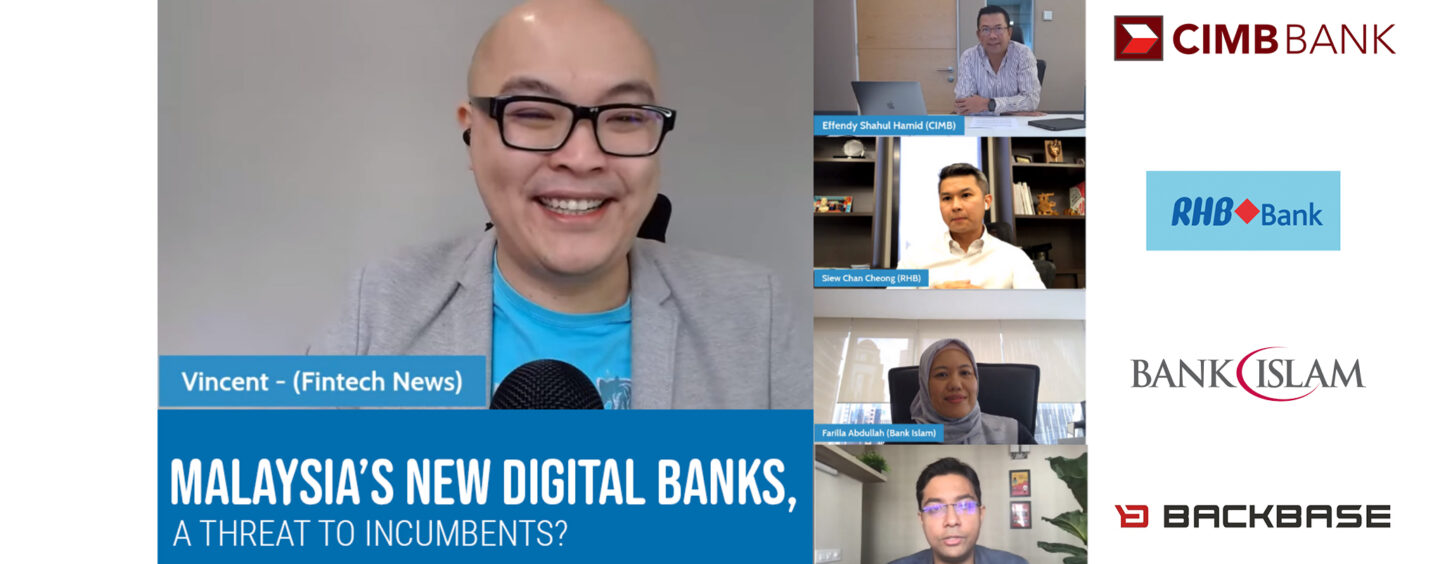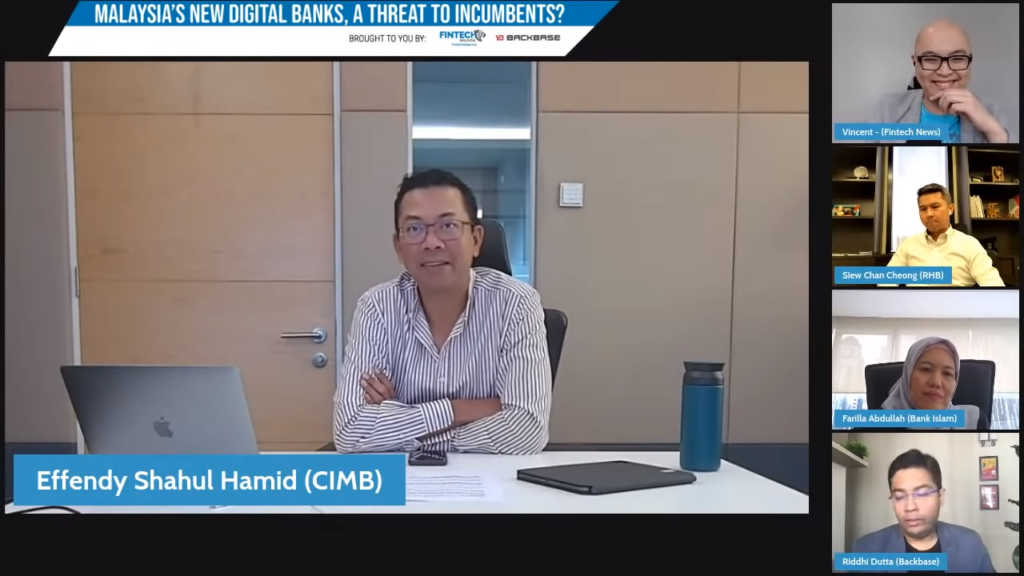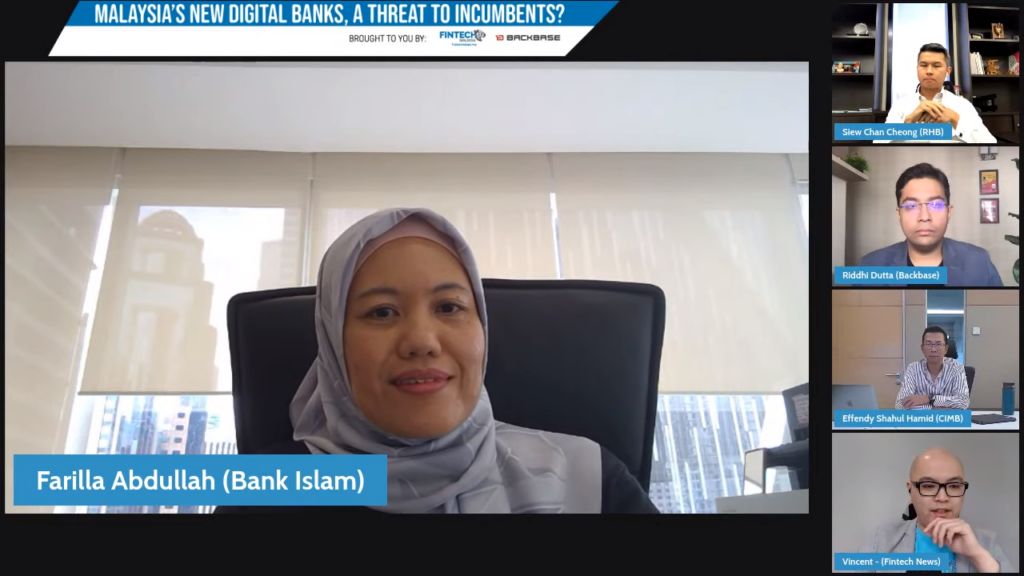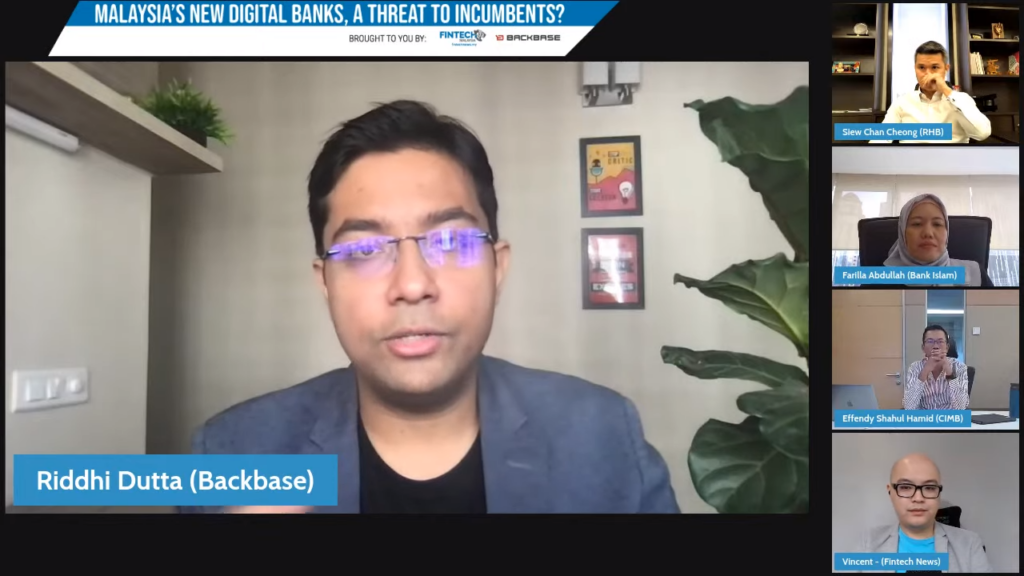
Malaysia’s Incumbent Banks Gears up for the Entry of New Digital Banks
by Fintech News Malaysia March 30, 2021In Malaysia, incumbents are gearing up for the entrance of the country’s first digital banks, accelerating digital transformation, planning standalone ventures, and partnering up with fintechs, top executives from CIMB Group, Bank Islam, RHB Banking Group, and Backbase said during a webinar last week.
Bank Negara Malaysia released the much anticipated digital banking framework in December 2020. Up to five licenses will be up for grabs, which the central bank will grant by the first quarter of 2022.
The forthcoming launch of Malaysia’s new digital banks are accelerating digital transformation in the banking sector, forcing incumbents to “raise the bar in terms of innovation in products and services, in delighting their customers, and also in the adoption of new business models enabled by digital technologies,” Noor Farilla Abdullah, Chief Strategy Officer of Bank Islam, said during the webinar.
For Effendy Shahul Hamid, CEO of CIMB Digital Assets and CIMB Group, and Group CEO of Touch ‘n Go Group, the biggest opportunity for digital banks in Malaysia lies in their ability to use digital capabilities to bring financial services to underserved segments.

Effendy Shahul Hamid, CEO of CIMB Digital Assets and CIMB Group
“It’s not just about banks becoming more digital, but about new capabilities that are going to be brought to the market, and the ability for customers, retail, small and medium-sized enterprises (SME), to take advantage of this,” Effendy said during the virtual discussion.
“All the players will benefit, but more importantly, the unserved segment … there’s a need to take care of these segments … [which] the traditional banking sector hasn’t been able to serve.”
For CIMB, digitalisation has been a top priority, Effendy said, noting that in its newest markets, namely the Philippines and Vietnam, the bank has opted to go full-digital, teaming up with fintech brands like GCash, the top e-wallet in the Philippines.
In its core markets of Malaysia, Indonesia, and to some extent, Thailand, CIMB has been focusing on modernising its core and “digitising the bank”.
“That’s a very difficult thing to do with a lot of legacy in place, but that’s something we need to do,” Effendy said. “In Malaysia, for example, if you consider that those new digital banks will become operational in 2022, early 2023, then the incumbents need to have some capabilities to compete.”
CIMB is also interested in joining a digital banking consortium and explore the licensing route, Effendy said. The idea behind this would be to complement its e-wallet business, Touch ‘n Go, with digital banking services.
“We do not need the control of a consortium, but we would be quite happy to play a secondary role in terms of bridging platforms and certainly financial services expertise,” Effendy said. “We are not obsessed with needing to do it, but we feel that there could be advantages.”

Noor Farilla Abdullah, Chief Strategy Officer, Bank Islam
For Bank Islam, a holistic transformation plan has been put into motion that involves changing organisational culture, developing an innovative mindset, and embracing technologies such as cloud computing, Farilla said.
In parallel, Bank Islam has set up a division that’s been tasked to build a spin-off digital bank from scratch.
“We set out to do everything differently from the get-go,” she explained.
“For example, the team we set up is cross-functional. We are also looking at new technology stacks so that we are not encumbered by legacy systems, and we also look towards, as much as possible, a full cloud implementation. We have also started looking for partners and service providers that share this vision, and who would give us agility, scalability.”
In Bank Islam’s journey in building their new digital bank, Farilla says that it’s key to behave more like an entrepreneur than a banker. She further added,
“The critical success factor is having the right mindset, it’s always about having the courage to push barriers and it’s about finding out what your Minimum Loveable Product that can be articulated clearly to your customers.”
Meanwhile, RHB Banking Group has been mainly focused on expanding its ecosystem, aggressively teaming up with other industry participants to bring new products and services to its customers, Dr. Siew Chan Cheong, Group Chief Strategy Officer of RHB Banking Group, said during the webinar.

Dr. Siew Chan Cheong, Group Chief Strategy Officer of RHB Banking Group
“The way we are competing is not just about offering financial services and products, but more about being an ecosystem solution provider for customers,” he said. “We look at consumers’ pain points and banking services as just one pain point.”
“In order for us to grow this ecosystem, we continue to partner with different players, whether that’s a fintech where we would get the technological, digital capabilities, talent and so on, or the non-financial service provider where we would get touch points or even data for our data analytics.”
When asked if RHB will be applying for a digital banking license, Dr. Siew said the jury is still out. “Whether we will apply for a digital banking license depends on if we want to get into a particular segment. That investigation and study is actually still ongoing. For now, we will focus on our core business and work with our partners.”
Riddhi Dutta, Regional Head for ASEAN and South Asia at Backbase, said the strategies adopted by CIMB, Bank Islam and RHB are representative of what other incumbents in Asia Pacific have done in light of recent digital banking developments.

Riddhi Dutta, Regional Head for ASEAN & India, Backbase
For example, Bank of the Philippine Islands (BPI), one of the banks Backbase is working with in the region, has gone all-in with its digital transformation plan, investing in key platforms and technologies.
“If you look at how this particular bank has grown despite all the competition, it has been remarkable. Currently, they have around 5 to 5.5 million customers accessing their digital channels, which is almost 100% growth in the last two years,” Riddhi said during the virtual conversation. “As a result of that, they have been able to access a lot of fintechs. The last I heard, they were working with 300 fintech partners because they had invested in certain platforms.”
Others, like Vietnam’s VPBank with its digibank arm named Ubank, have launched full digital brands with clear target segments, sets of offerings, and differentiators. “You take the best of both worlds; you bring in your legacy, your trust, plus you bring in new ways of working, innovation, agile techniques, and all of that.”
“These are the three main strategies … we’ve seen,” Riddhi said. “Banks [choose one strategy or the other] depending on their risk appetite, where they see themselves in the next few years, how confident they are about their own internal operations, and how innovative they are.”
The full webinar can be viewed below, if you enjoyed this content do consider subscribing to our YouTube Channel for more.






